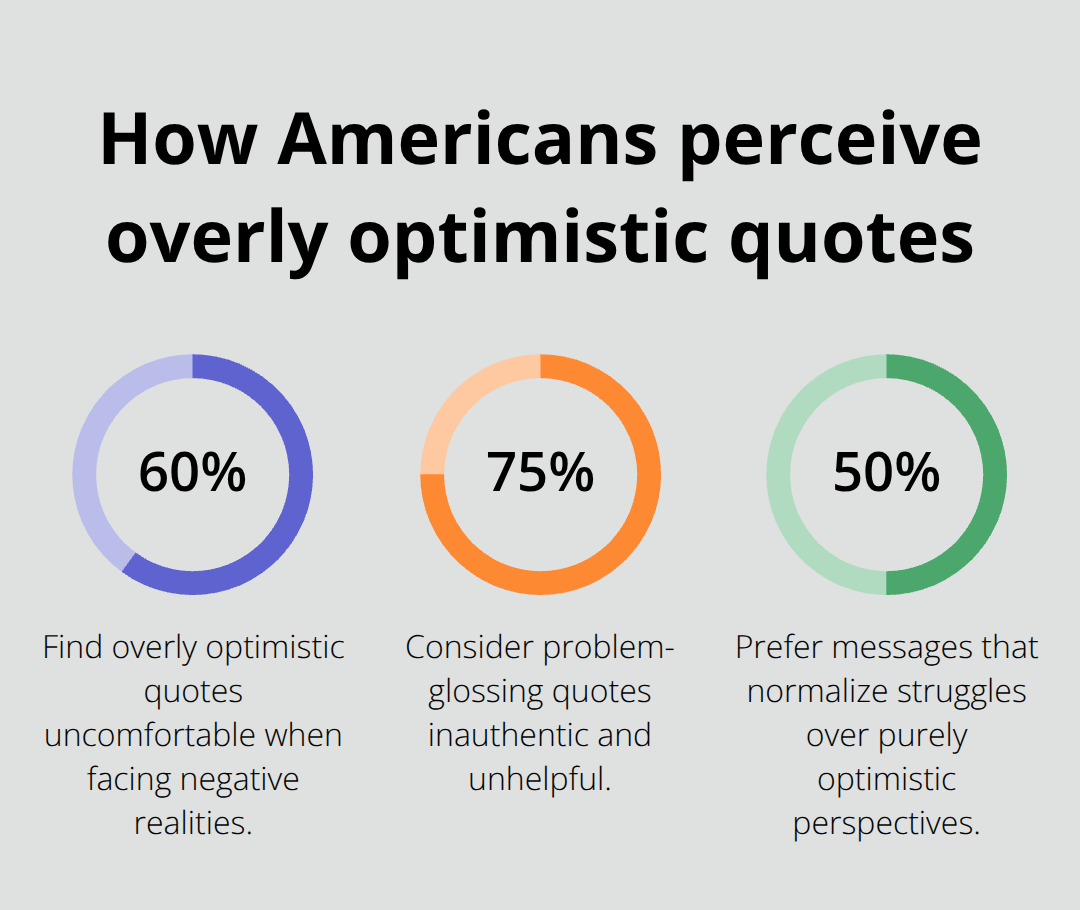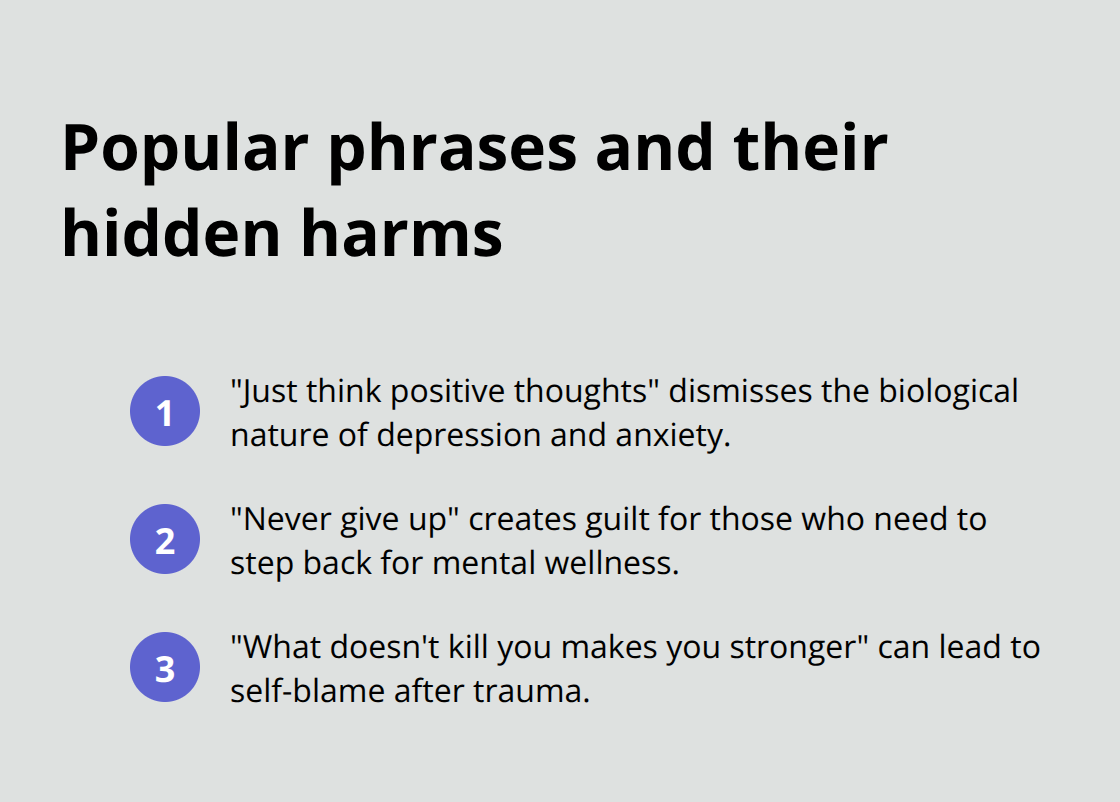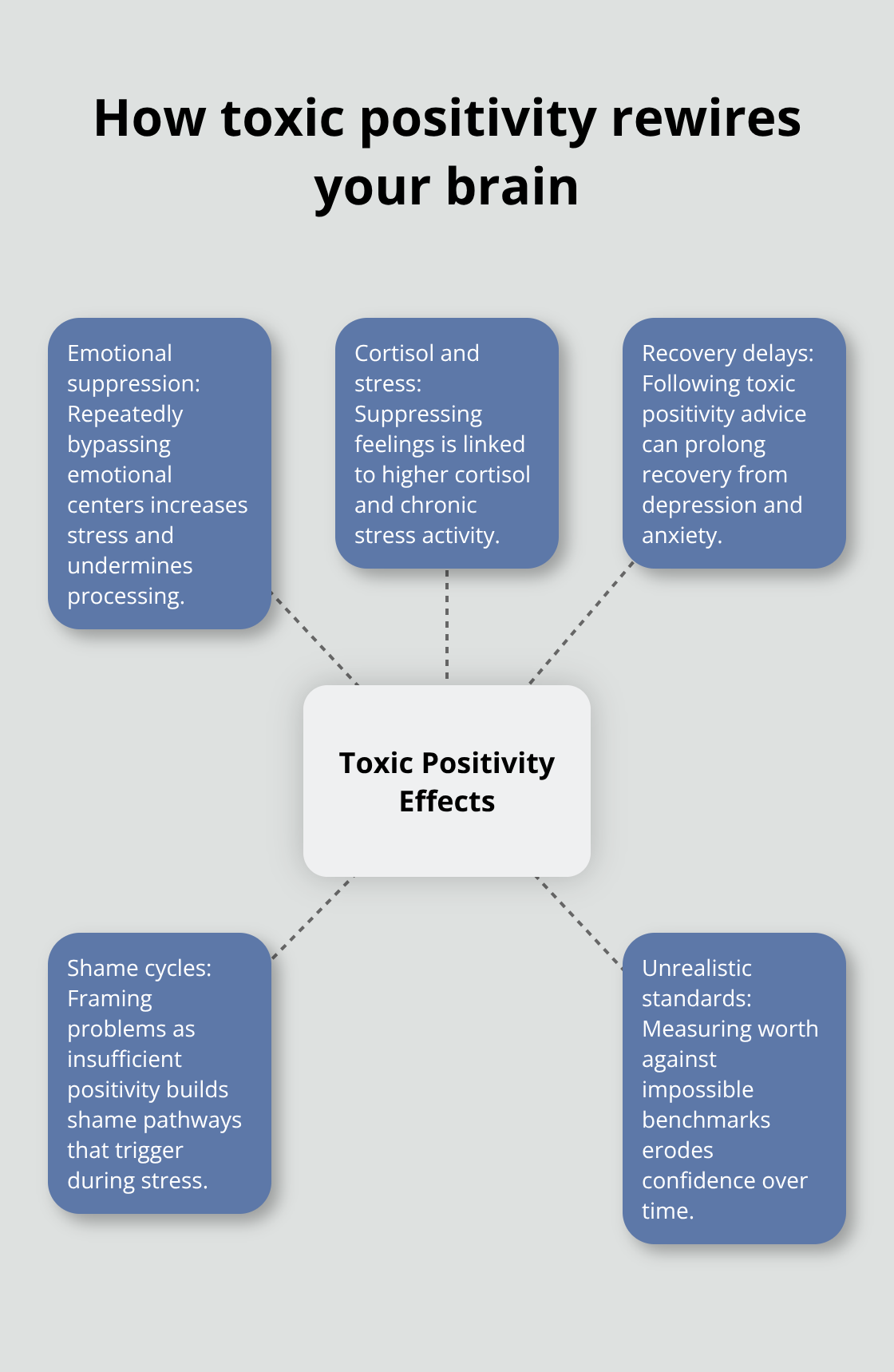Ominous positivity quotes flood social media feeds daily, promising instant happiness while hiding dangerous psychological traps. These seemingly uplifting messages often mask toxic expectations that can harm mental health.
We at Global Positive News Network believe it’s time to examine the dark side of forced optimism. Many popular inspirational phrases actually suppress authentic emotions and create unrealistic life standards.
Why Positive Quotes Feel So Wrong
The Mask That Hides Real Pain
Surface-level optimism creates psychological discomfort because it forces people to ignore legitimate concerns. When quotes like “Everything happens for a reason” dominate workplace culture, employees suppress valid frustrations about poor management or unfair treatment. The American Psychological Association shows that people who acknowledge negative emotions manage stress better than those who force positivity. Gallup found that 50% of people prefer messages that normalize struggles rather than purely optimistic perspectives. This disconnect between reality and forced cheerfulness creates cognitive dissonance (making inspirational content feel hollow and manipulative).
The Performance of Happiness
Motivational phrases create unrealistic timelines for emotional recovery and personal growth. Phrases like “Just think positive thoughts” ignore the biological reality of depression and anxiety disorders. Psychology Today research indicates that 60% of people find overly optimistic quotes uncomfortable when they face negative realities. Harvard Business Review surveys show 75% of individuals consider problem-glossing quotes inauthentic and unhelpful.

Research shows that 37% of U.S. high school students report regular mental health struggles, highlighting the disconnect between forced positivity and actual experiences.
When Inspiration Becomes Invalidation
These expectations transform natural human experiences into personal failures. The pressure creates shame cycles that worsen mental health outcomes rather than improve them. People start to believe their struggles indicate personal weakness rather than normal human responses to difficult circumstances (which leads to isolation and self-blame). When content makes you feel guilty for bad days or suggests your problems stem from insufficient positivity, you encounter this harmful trend. The next section examines specific quotes that perpetuate these harmful patterns and explores how seemingly innocent phrases carry dangerous psychological implications.
Which Popular Quotes Hide Dangerous Messages
The Self-Help Industry’s Deceptive Promises
The wellness economy encompasses multiple sectors and packages toxic positivity as wisdom. Phrases like “Good vibes only” and “Happiness is a choice” dominate bestseller lists and social media platforms. These messages create billion-dollar empires built on psychological manipulation while they ignore the complex biological and psychological realities of mental health disorders.
Brené Brown advocates for vulnerability and authenticity instead of surface-level optimism. Pew Research Center shows that 78% of millennials report pressure to maintain positive outlooks during tough times. The phrase “Everything happens for a reason” invalidates personal struggles and leaves individuals isolated when their experiences don’t align with predetermined meaning.
When Motivation Becomes Mental Manipulation
Specific motivational phrases cause measurable psychological harm through unrealistic expectations and emotional suppression. “Just think positive thoughts” dismisses the biological nature of depression and anxiety. “Never give up” creates guilt for those who need to step back for mental wellness.
Lee Chambers notes that toxic positivity leads people to ignore their struggles, which makes mental health issues worse rather than better. The Journal of Experimental Psychology found that individuals who accepted negative emotions handled stress and anxiety better than those who suppressed them.

The Hidden Damage of Popular Mantras
Phrases like “What doesn’t kill you makes you stronger” oversimplify human experiences and can lead to self-blame when people don’t emerge stronger from trauma. “Manifest your destiny” creates additional pressure and self-blame when challenges arise (contradicting healthy coping processes).
Chris Ryan, founder of Ominous Positivity Memes, believes that acknowledgment of struggles while offering support creates healthier mental frameworks than traditional positive messages. His approach gained over 100,000 followers within a year because it resonates with people who feel alienated by conventional positivity.
These harmful patterns extend beyond individual quotes and create systemic problems that affect how we process emotions and cope with life’s challenges.
How Toxic Quotes Rewire Your Brain
Emotional Suppression Creates Mental Health Crises
Toxic positivity quotes train your brain to suppress negative emotions rather than process them in healthy ways. When you repeatedly tell yourself that happiness is a choice or that everything happens for a reason, you activate neural pathways that bypass emotional centers. Research demonstrates that people who suppress emotions experience higher cortisol levels and show increased activity in brain regions associated with chronic stress.
Mental health professionals report that clients who follow toxic positivity advice take longer to recover from depression and anxiety episodes. Your brain needs to process grief, anger, and fear through the limbic system to maintain psychological balance. Suppression forces these emotions underground where they manifest as physical symptoms, relationship problems, and cognitive dysfunction.

Shame Cycles Replace Natural Human Responses
Popular motivational phrases transform normal emotional experiences into personal failures through neurological patterns. When quotes suggest that your problems stem from insufficient positivity, your brain creates shame pathways that activate during natural stress responses. Mental health professionals report that clients who consume toxic positivity content develop secondary shame about their primary emotional experiences.
Your nervous system interprets sadness, worry, and disappointment as evidence of personal inadequacy rather than appropriate responses to difficult circumstances. This creates feedback loops where emotional pain triggers self-criticism, which intensifies the original pain and prolongs recovery periods (making simple problems complex psychological battles).
Unrealistic Standards Damage Self-Worth
Motivational quotes establish impossible benchmarks that erode confidence over time. Research shows that people exposed to toxic positivity messages report higher levels of self-blame and isolation compared to those who receive validation for their struggles. Your brain starts to measure worth against fictional standards rather than realistic human experiences.
These messages create cognitive distortions where temporary setbacks become permanent character flaws. The constant pressure to maintain artificial happiness exhausts mental resources and prevents authentic emotional growth (which leads to chronic dissatisfaction despite external achievements). However, gratitude journaling and other evidence-based practices can rewire your brain in healthier ways when applied appropriately.
Final Thoughts
Healthy positivity acknowledges the full spectrum of human emotions while it maintains hope for improvement. Unlike toxic messages that demand constant happiness, authentic optimism validates struggles and offers realistic pathways forward. Mental health professionals recommend phrases like “This is difficult, and you’re handling it” instead of dismissive statements that minimize pain.
The difference lies in timing and context. Healthy encouragement comes after emotional validation, not as a replacement for it. Research shows that people recover faster when they process negative emotions rather than suppress them through forced positivity mantras (which create more psychological harm than healing).
Authentic emotional experiences require space for sadness, anger, and fear alongside joy and hope. These feelings provide important information about your needs and circumstances. When you encounter ominous positivity quotes that make you feel guilty for natural responses, trust your instincts and seek more balanced perspectives. We at Global Positive News Network focus on genuine stories that honor both struggle and growth.


